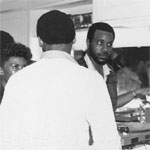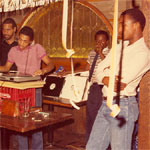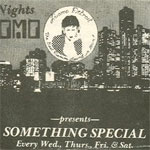 Auf Bleep43 gibt’s jetzt ein Detroit Beatdown Interview von Dan Bean mit den Beatdown Members Mike Clark, Norm Talley und Delano Smith aus dem Jahr 2005. Das Wax Poetics Magazine hat dieses Interview bereits 2006 in einer bearbeiteten Fassung veröffentlicht und auf Bleep43 gibt’s jetzt das originale Transcript. Außerdem dabei: einige Photos und Orginal-Flyer im Text, DJ-Charts am Ende und die richtige Musik zum Interview findet ihr im Myspace Player bei Beatdownsounds! Ach ja, falls es jemanden gleich zu Beginn des Interviews wundern sollte, was oder wer denn nun dieser Mojo sein soll, dem hilft Wikipedia unter The Electrifying Mojo.
Auf Bleep43 gibt’s jetzt ein Detroit Beatdown Interview von Dan Bean mit den Beatdown Members Mike Clark, Norm Talley und Delano Smith aus dem Jahr 2005. Das Wax Poetics Magazine hat dieses Interview bereits 2006 in einer bearbeiteten Fassung veröffentlicht und auf Bleep43 gibt’s jetzt das originale Transcript. Außerdem dabei: einige Photos und Orginal-Flyer im Text, DJ-Charts am Ende und die richtige Musik zum Interview findet ihr im Myspace Player bei Beatdownsounds! Ach ja, falls es jemanden gleich zu Beginn des Interviews wundern sollte, was oder wer denn nun dieser Mojo sein soll, dem hilft Wikipedia unter The Electrifying Mojo.
Introduction from the Wax Poetics article:
Ask music lovers what Detroit means to them and you’ll probably hear mention of Berry Gordy or Norman Whitfield, perhaps George Clinton or Yusef Lateef. Were you to point out that there’s a direct link between these styles and the pared down machine funk of the city’s latter day sound (known by some as techno), you could safely expect incredulity from all but the most dedicated fans.
Yet there is a link, forged in the high school social parties of the seventies and the clubs and radio shows of the eighties by a few key figures. These musical visionaries shepherded their dancers and listeners from disco, via hi-nrg and italo through to the earliest house records, not forgetting a healthy dose of the leftfield and unexpected.
This sound, or maybe this ‘feeling’, is known as Beatdown and owes a great deal to the eclectic, boundary defying styles of DJs such as Ken Collier and the mysterious radio presenter Electrifyin’ Mojo.
The modern inheritors of this style are the present day Beatdown DJs of Detroit. Three in particular have channelled the vision of the godfathers of Beatdown, both through their DJing style and the release of documents such as the Detroit Beatdown Volume 1 compilation. They are Mike Clark, Norm Talley and Delano Smith.
The day after Detroit’s annual electronic music festival we met at Mike Clark’s apartment to discuss the origins of their music, the advent of drum machines and story of DJing in an era that pre-dated labels such as house and techno.
Interview transcript:
Dan Bean: Firstly, if I could just start the interview off by you introducing yourself, saying who you are, where we are, what we’re doing.
Mike Clark: OK, Am I introducing it host style or am kinda…
DB: Just yourself.
MC: OK. Ready? Hello this is Mike Clark Agent X sitting here in Detroit, kicking it at the house, enjoying myself. How you doing? (pause) Good. I’m at home by the way, that’s why.
DB: Did you grow up in Detroit?
MC: Yeah, I was raised on Seven Mile, Greenfield Southfield area. A lot of the people that are part of our set grew up in Seven Mile, Six Mile, a little further in and out. I guess you know, coming from that area everybody just had their own thing that was going on, but mostly a lot of Detroiters grew up on Mojo, listening to that eclectic radio show that was really grabbing ears. We had another radio station called WJZZ that was at the time the most celebrated jazz radio station and they played all different forms of jazz. Me myself, my influences came from listening to JZZ ‘cause they was the days when they played early Herbie Hancock and Azymuth and a lot of those jazz classics that we dance to today they were playing on the radio station on the daily. And Mojo came out during that era and he was another free spirit that pretty much played anything he wanted to There’d be no given night where he’d do what you call Micheal Jackson versus Prince and he’d just play Michael Jackson all night then he’d start playing Prince all night and he’d tell the voters to call to see who won. You know, just eclectic stuff like that. Or he’d just play like some rock or he’d play Parliament all night. He’d just play some cool stuff and he had Detroit right where he wanted us.
- Bleep43
- Mike Clark
- Norm Talley
- Delano Smith
- Beatdownsounds



